Shauna’s family history A – Z.
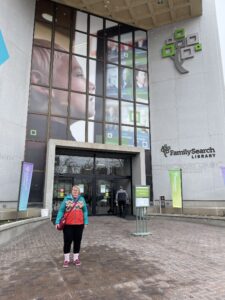
Outside the FamilySearch library in Salt Lake City. Author’s own collection.
It is always a challenge when asked to do a guest blog for GSQ. What do readers want? January is a time of looking forward to what we might do during the year. Here are a few of my thoughts for genealogy in 2024. Apologies in advance, I am a bit wordy.
A is for Archives
My visits to the Runcorn State Archives are few and far between mainly because of distance, traffic and driving on freeways. It is about a 4 or more-hour return trip. But with my PhD research I do need to make more frequent trips. To make the most of my time there, I need to do a research plan, pre-order my items, and take a USB to get digital copies of files on microfilm. You can read files at home later. Maximum use of archives time is my new mantra.
B is for Brick Walls
Yes, even after 47 years researching, I still have brick walls. My most frustrating one is my GG grandfather James Henry Trevaskis who disappeared in Copperfield, Queensland during a five-year period in the 1870s. His wife Elizabeth declared herself a widow and married George Guy in Copperfield before moving their blended family to Charters Towers. I can’t find a death certificate, any record of death or burial in the newspapers, no cemetery record, no nothing to tell me what happened to James Henry.
C is for Conferences
I love going to conferences because you get to listen to fantastic speakers, meet up with friends and relatives, make new friends and simply have a good time. Covid put a dampener on conferences a little, and many are now virtual or hybrid. I have attended some excellent online conferences for a fraction of the price it would have cost for airfares and accommodation.
D is for DNA
DNA is not for anyone that doesn’t like surprises, but I have now accepted that Dad’s paternal family was not who I thought. I have become fascinated with Islandmagee in County Antrim, Ireland as several of Dad’s family lines trace back there. I am part of two DNA projects for the area and it is good to see those projects growing as more people join.
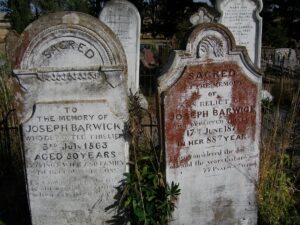
Barwick graves in Tasmania. Author’s own collection.
E is for Evaluate
This is especially true for my older research when we didn’t have such wonderful access to online resources. It is good practice to review family lines from time to time. New records have been indexed, digitised or put online. Seeing the original record may even tell us more information than the transcript.
F is for Family
Without family, what would we research? My little grandson will turn 2 this year and I am planning a trip to Sweden to see him. If only they still lived at Upper Mount Gravatt! Last year I went to Sweden for a white Christmas and not one snowflake. This year they are snowed in, and I would never have got out to come home. I didn’t think that would be so bad until my son said that it was minus 20!
G is for Genealogy
What else? Researching our ancestors helps us to understand ourselves and where we have come from. It is a lesson in the history of many countries (for most of us, although Mum was entirely English). It is a way to keep our minds engaged and thinking and up to date with all the latest technology. It gives us friends and places to go like libraries and archives.
H is for how to pass our research on
I have been grappling with this for the past four years. I have tossed, weeded, scanned, tagged, and written up family stories and it seems like I still have a long way to go. Forty years of research is a lot, and it is the physical side that gives me most grief. For example, my mother’s wedding album is waiting for me to decide. No one wants it. I want to digitise the photos and then have a digital wedding album. But what do you do with the original?
I is for Ideas
One of the great things about technology is that there are so many ways to learn new ideas from others. Social media is obvious and how often have you said, ‘I must try that’. Don’t be afraid to try new things or to share your own ideas with others.
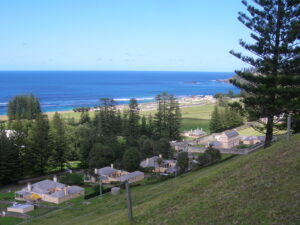
Norfolk Island, an early convict settlement. Author’s own collection.
J is for Joining a Society
Can’t stress this one enough. I am a member of multiple societies and always look forward to reading journals and catching up on news. I can even attend virtual meetings and events from afar. But really, we should all be a member of our local society as we can meet and share updates in person. I have local society friends going back decades. We can go to any event, and chances are we will also know at least one other person.
K is for Kernel
Or nutting out our family brick walls. Or nutting out a plan to scan all those print photographs, then label and file them. Or kernel is the heart of what you are going to do with all your research at the end of the day. No easy task but once the shell is off, it is easier to get to the kernel of why you are researching your family history.
L is for Learning
Videos and webinars all over the internet just Google “genealogy videos” or similar. The topics are wide, and, in most instances, you can see them for free. Some professional genealogists, archives, libraries or societies have their own YouTube channels. Who needs TV?
M is for Money
No hobby is free, there are always expenses and we must pay for certificates or access to certain databases or to see behind a society’s ‘members only’ wall. In Australia we are lucky that our libraries and archives have so many online resources and easy access to their online catalogues. Societies cost money to join but, in my experience, members easily get value for money each year.
N is for Nick Vine Hall Awards
Somehow, I find myself the convenor of the Nick Vine Hall Awards for AFFHO (Australasian Federation of Family History Organisations). The Awards are to encourage societies to publish journals and for society members to write articles for publication. Does your Society participate? If not, perhaps they should, and further information for journal editors is on the AFFHO website.
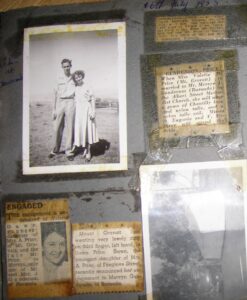
Page from Mum’s old photo album. Author’s own collection.
O is for Obsession
And no, not the perfume! What can I say – I have an obsession (not an addiction). I love history, research, places, travel and learning what it was like to live in times past. How many of our stories are lost because no one has recorded them?
P is for Photographs
This is a two-fold problem for me. There are all Mum’s print photos and albums which need to be assessed, scanned, labelled and filed. And then there are my digital photos which I promise myself that I will tidy up after each trip or event. But then, I don’t seem to find the time. The backlog grows and then I simply can’t face it. Easier to read a book or do some more research.
Q is for Question
Question everything. People make mistakes. Remember to have 2-3 or more sources for each piece of information. Does your research make sense? Children can’t be born before mothers. Is the place recorded correctly? Autofill is fantastic but it can cause problems if you mean Brisbane in Queensland and not Brisbane in Canada. Check everything.
R is for RootsTech
This is the annual world conference hosted by FamilySearch which is free to view online. This event just gets bigger and bigger each year. Last year I was fortunate to attend in person for the first time. This year I will be attending online only and as sessions are recorded, you can watch them at a time that suits you.
S is for Sleep
Someone once said I mustn’t sleep because I am always doing genealogy. I regularly get about 7 hours sleep a night which allows me to wake up naturally. I am a morning person so in bed reading by 9, lights out by 10 and wake at about 5am. After a cup of tea, I find that I do my most productive work before 9am. Sleep is essential, but my preference is to chase my ancestors in the daylight hours.
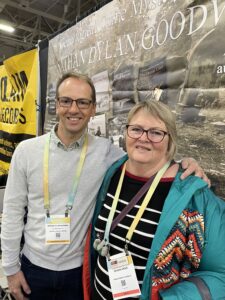
Meeting Nathan Dylan Goodwin at RootsTech. Author’s own collection.
T is for Travel
Nothing beats travelling in the footsteps of your ancestors. Visiting a cemetery and finding your ancestors grave is a must.
If you can’t travel in person, Google maps is fantastic for travelling around the streets where they lived. Is their house still standing or buried under some motorway? Find out addresses from the census or directories and check it out.
U is for Understanding
As hard as it may be to understand, not everyone wants to do a DNA test. Nor does everyone want to answer questions about our DNA matches. We must always think about others and be patient, as they may change their minds.
V is for Volunteers
Where would we be without them? They index, digitise, staff society libraries and work on society projects, correct text in Trove, identify photos and so many other genealogical tasks around the world. Crowd sourcing projects mean that indexes are created so much faster.
I do a lot of volunteer work on Bribie for the local society. I also volunteer on projects for QFHS and this blog post for GSQ as well as the Nick Vine Hall Awards for AFFHO. None of these volunteer roles take up a lot of time, but they all help to assist societies to provide services to members.
Thanks to all genealogy volunteers out there.
W is for Writing
My long-term plan is to self-publish online my individual family histories. I have five based on my Carnegie, Finn, Price, Trevaskis and White family lines. There are drafts and I’m working on adding or improving citations and of course I can’t resist adding new information. I will finish, I must finish will be my 2024 mantra.
X is for Signature
How many of your ancestors marked their name with an X? There are a lot in my family history but mostly on Dad’s side which was Irish and on Mum’s Cornish side. I know in some instances from the time they marked their X on the marriage register to the time they signed their name on their last will and testament, they had learnt to at least sign their name. But not always.
Y is for Yes
Take a risk and say yes to being a volunteer. Or to attending a seminar or conference. Or even learning to Zoom if you haven’t done that yet. Yes, brings opportunities and who knows where that might lead.
Z is for Zip
2024 will be over in the blink of an eye (2023 certainly was). No time to waste, zip into drawing up your family history research plan for 2024. Think about my A-Z. What would your A-Z look like?
Good luck with your family history research in 2024.

I love this. You’ve captured the essence of genealogy for me. It’s a great inspiration.
Thanks Yvonne for your response. Hope you have a wonderful genealogy year in 2024.
Great post Shauna – so interesting and I’m sure many of us will empathise with your ideas, and problems. My brick wall McSharry is much the same and those photographs!
Thanks Pauleen. Yes we all have similar issues so good to share them with others for fresh inspiration. See you next week at Caloundra.
I’m just frustrated. So much I want to do but so many family health issues and I just can’t focus.
Hi Di sorry to hear about the family health issues. Family history is something you can pick up, put down and come back to when things are going better. When I was going through chemo the only thing that kept me going was escaping into family history research. Take care